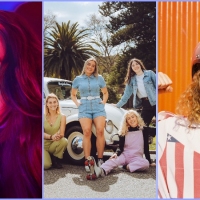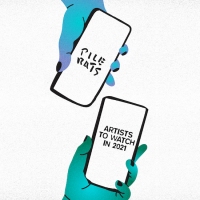 October in WA Music: Dulcie, BEXX, Noah Dillon + morePlus brand new singles from Lo and Alter Boy as we recap the best local tracks of the last month.
October in WA Music: Dulcie, BEXX, Noah Dillon + morePlus brand new singles from Lo and Alter Boy as we recap the best local tracks of the last month.

How Deadly Hearts captures the musical peaks of Indigenous Australia
On their third compilation, the Deadly Hearts record welcomes some of Australia’s most brilliant - and important - musicians to the forefront.
Since 2017, you haven’t had to look further than ABC’s Deadly Hearts compilation to find a new Indigenous Australian musician worth discovering.
The compilation - which has three issues now; their debut in 2017, followed by second and third editions in 2019 and 2020 respectively - reads like a greatest hits of Indigenous music, capturing the charm of some of the country’s best and most important musicians on a platform that without it, removes a large presence for many of these musicians in the commercial eye. It’s something that goes beyond your standard article or playlist, capturing every facet of a blossoming music space from its rappers to its acoustic folk musicians, from areas like Melbourne and Sydney right through to remote communities in the Northern Territory and Central Queensland.
Take their debut release, for example. It brought rappers such as Jimblah and Birdz together with Emily Wurramara - whose Milyakburra record merged English and Anindilyakwa together with pacing indie and rock. The second compilation, released ahead of NAIDOC Week 2019, welcomed acts like Electric Fields and Dallas Woods side-by-side with Alice Skye and Busby Marou; each artist connected by a shared appreciation of cultural rejuvenation as they took songs monumental to them and added their own distinct twists onto them.
The third issue, released this year, is slightly different. It features a wide-spanning range of musicians with diverse backgrounds and genres, but instead of covering a song monumental to the greater Indigenous culture and identity, it covers songs monumental to the artists personally - songs that have defined them musically and personally, or the songs they look up to for inspiration. The end result spans a further net than ever before, highlighting songs that range from the monumental - Beds Are Burning, Don’t Dream It’s Over - to the more guilty, like Vanessa Amorosi’s long-iconic Absolutely Everybody.
While Deadly Hearts - Walking Together may lose the foundation that triggered its initial cover choices, it doesn’t lose anything else - the charm, nor the versatility, nor the sheer amount of talent captured within. Instead, it shines greater than ever before, emphasising the rich tapestry of Indigenous Australian talent that proves there’s a brilliance worth emerging yourself into if you’re not already; a brilliance built off cultural storytelling and creative energy dating back further than anywhere ever on the planet.
Take Ziggy Ramo’s taken on Miiesha’s Tjitji, for example, and how he loops her soothing vocals into a passionate display of intimacy that moves between themes and experiences from throughout his life, making what’s already a vulnerable and touching moment all the more so. It’s two voices of the future coming together in a way that allows art to flourish; Miiesha - sharing her debut album this year - having her stories built upon by Ziggy, who also shared his debut album this year. It’s an opportunity that wouldn’t happen under the compilation’s past ethos; a nod to someone whose made an impact on Ziggy in the same way Ziggy has no doubt made a major impact to those looking for success in a music industry that often feels built against them.
It isn’t the only special moment to take place throughout Walking Together, however. Kobie Dee embraces his country with a cover of Ernie Dingo's A Long Way Away From My Country - “for me, growing up on Bidjigal land in Sydney and my country being Gomeroi in Moree, I always related to the song,” he says - while Miiesha uses a Woorabinda choir to shin a light on those from the small, central Queensland communities like herself.
Drmngnow and Emily Wurramara’s own Archie Roach interpretation - of Get Back To The Land - becomes only more crucial considering the disrespect and destruction of Indigenous land in recent weeks. Southeast Desert Metal’s cover of Midnight Oil’s Beds Are Burning is similarly timely, “Indigenous people are still struggling today,” says the band’s Chris Wallace. “This land was stolen from us. In this song we’re saying it's time to give it back.”
There’s also a couple of other moments that capture the joy of Indigenous art, and the cathartic freedom that comes with a level of public self-expression like this. Take Mitch Tambo’s take on Vanessa Amorosi’s Absolutely Everybody, sung in Gamilaraay language as a celebration of how people can bind together despite their differences, laden with Indigenous percussion and howling didgeridoo. Sycco’s cover of PNAU’s Solid Gold is another; an expression of celebratory joy in its most pure form.
Deadly Hearts is an essential record to the Australian musical canon, emphasising and elevating stories and moments otherwise untold to commercial Australia; stories otherwise left internalised. It captures the essence of the First Nations’ rich culture, from the moments that shine a light on issues often left unexplored in the public eye right down to the moments more self-empowering and joyful, tapping into the unrivalled energy and passion of the world’s longest-spanning art.
“[It’s] the perfect opportunity to further your learning around the history of the peoples of the land in which you live on to not only equip and educate yourself but to play a part in the greater dialogue of all of us coming together as one to face the whole truth of our beautiful nation so we can journey together, healing and loving one another one step at a time,” says Mitch Tambo, and we couldn’t say it any better.
Always Was, Always Will Be.
ABC's Deadly Hearts - Walking Together Compilation is out now.
 October in WA Music: Dulcie, BEXX, Noah Dillon + morePlus brand new singles from Lo and Alter Boy as we recap the best local tracks of the last month.
October in WA Music: Dulcie, BEXX, Noah Dillon + morePlus brand new singles from Lo and Alter Boy as we recap the best local tracks of the last month.
 The Future is Here: Meet 20 Australian artists to watch in 2021From ASHWARYA and BEXX to Teenage Joans and will hyde, here are 20 Australian musicians you’re gonna fall in love with in 2021.
The Future is Here: Meet 20 Australian artists to watch in 2021From ASHWARYA and BEXX to Teenage Joans and will hyde, here are 20 Australian musicians you’re gonna fall in love with in 2021.